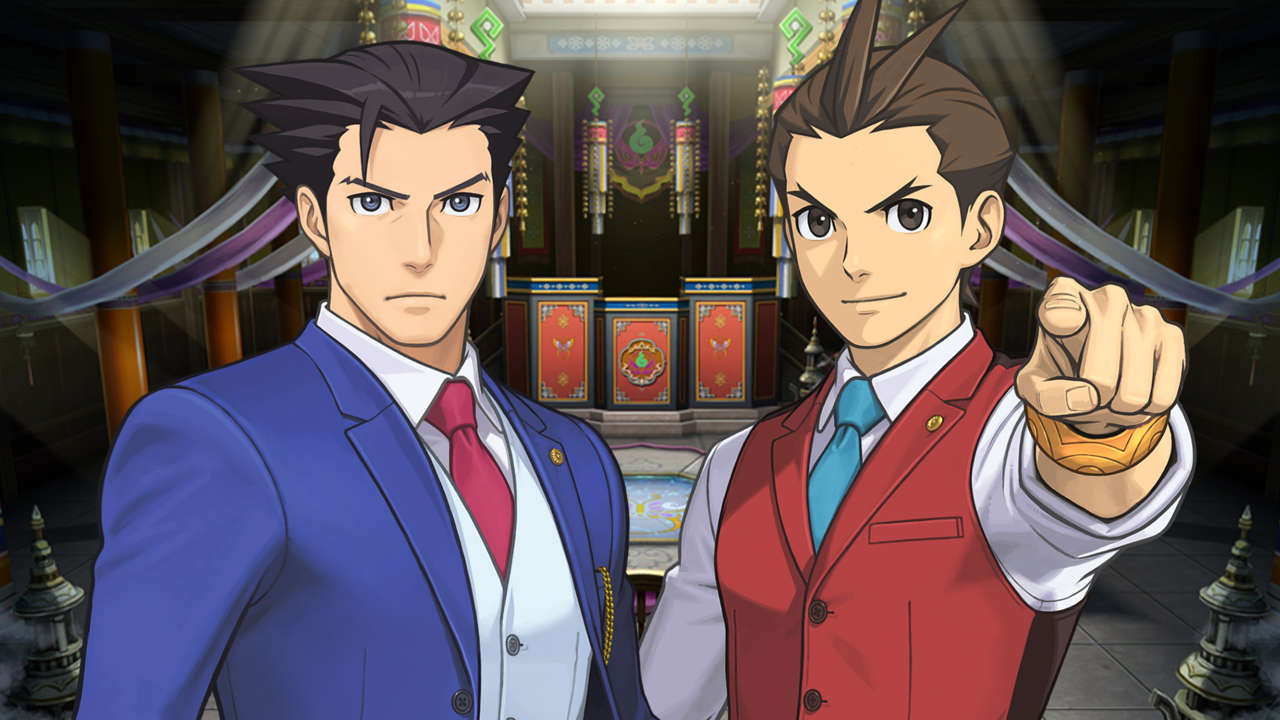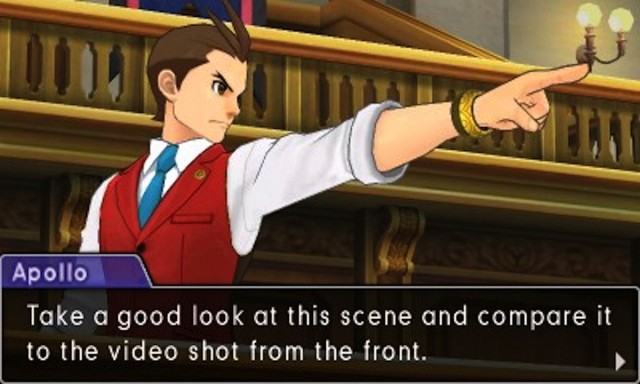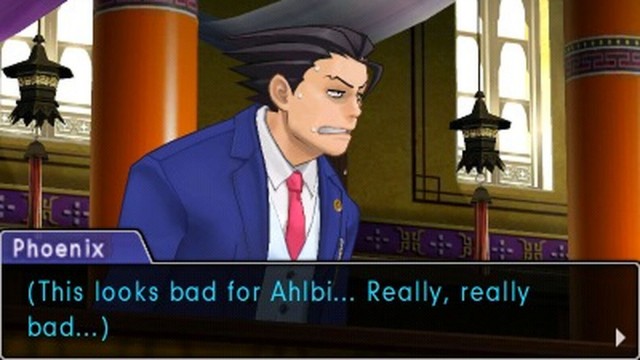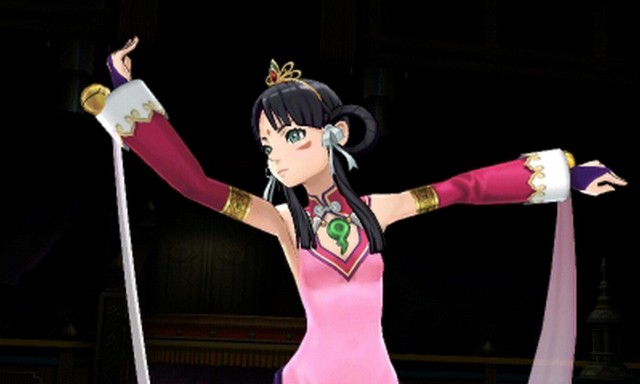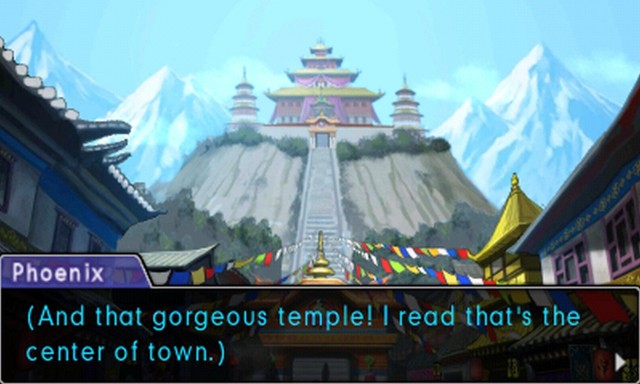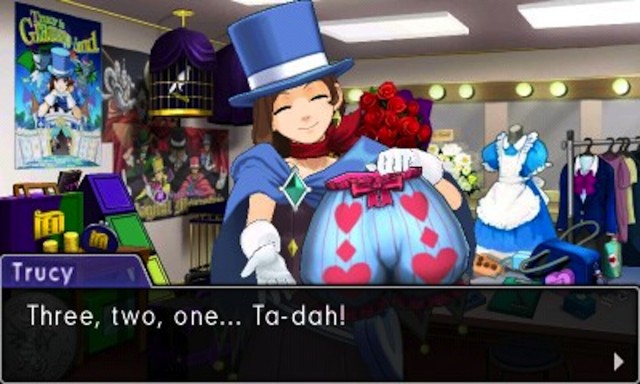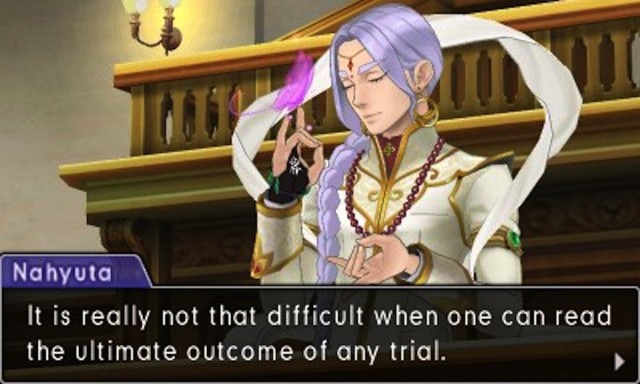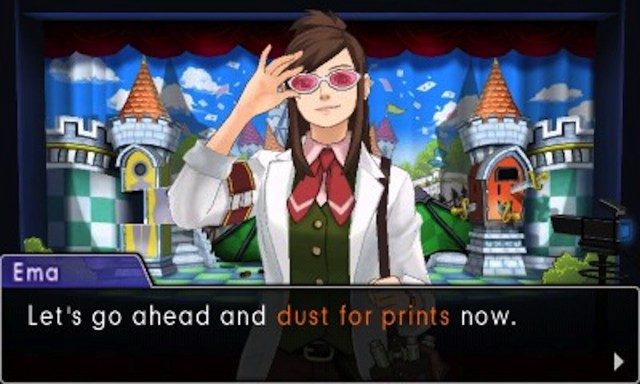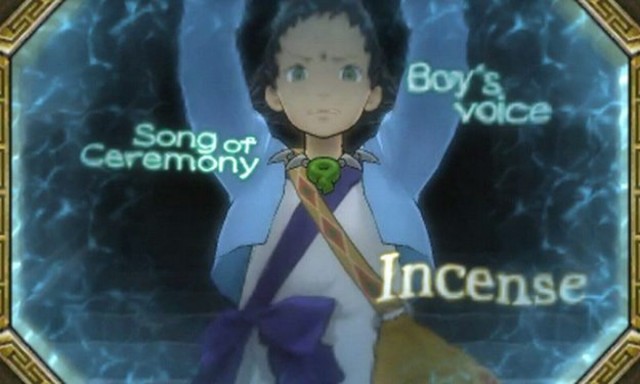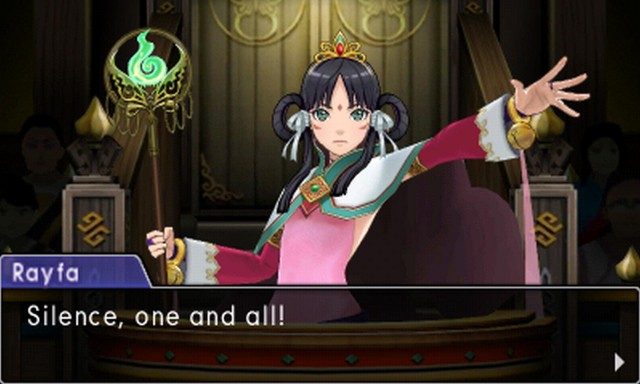The law is eccentric enough on the recognizable shores of the Ace Attorney franchise, but when Phoenix Wright finds himself in the far-off country of Khura’in, he’ll be in for legal battles unlike anything he’s faced before! Phoenix Wright: Ace Attorney – Spirit of Justice not only continues the mainline adventures of Phoenix and his legal cohorts, but it also divides the game between familiar court sessions, and all-new international justice chambers, placed within a kingdom where lawyers are despised and distrusted, and the final memories of the dead are the only evidence that matters.
Considering the melodramatic high stakes behind all of Ace Attorney’s courtroom duels, it’s sort of amazing that Spirit of Justice creates an atmosphere where the stakes have truly never been higher. Thanks to a Khura’inese law called the ‘Defense Culpability Act’, Phoenix himself will be put to death if his clients are found guilty, and even his legal partners, Apollo Justice and Athena Cykes, face nigh on certain doom back home all the while. Even considering the ‘Dark Age of the Law’ from the previous mainline game, 2013’s Phoenix Wright: Ace Attorney – Dual Destinies, the Ace Attorney franchise is really putting its leads through the wringer like never before. This leads to a new batch of cases, mysteries and courtroom battles that are among the series’ best in many years, making Spirit of Justice an especially standout offering for longtime Ace Attorney fans!
That said however, those who couldn’t get into Capcom’s offbeat text adventure/lie-probing game series in the past once again won’t find anything in Spirit of Justice that will change their minds. This is still a tried-and-true Ace Attorney game, with the same reliable gameplay foundation and the same stubborn issues here and there (including Western fans having no choice but to download the game digitally from the 3DS eShop, despite a retail package being available for Spirit of Justice in its native Japan), though the new evidence mechanics and revised setting for the Khura’inese trials still make Spirit of Justice the freshest and coolest spin on the franchise in quite a while, at least between the installments that have successfully released outside of Japan.
Spirit of Justice recycles a lot of visual assets directly from Dual Destinies, particularly in regards to the main character models (though some, namely Athena and Trucy, have had some colour alterations), and in general, the art style is completely unchanged from the previous game. This isn’t necessarily a bad thing though, since Dual Destinies was already a very sharp-looking 3DS game, and the same is true of Spirit of Justice. The character models once again stand out most as well, with the anime-esque art style creating super-expressive, vibrant and memorable personalities through each quirky case that you’ll play through.
As is typical of the Ace Attorney games, you’ll deal with static backgrounds, and three-dimensional character models and effects, creating a sort of three-dimensional polygonal/anime hybrid style. There’s a lot of cool flair to the Khura’in settings and personalities in particular too, with exotic-looking courtrooms and fashion that give the alternate country a great sense of foreboding, but neat style. The Khura’in designs also work great in terms of accentuating the heightened occult flavour in Spirit of Justice, and that’s especially true during the new Divination Seance sequences, where a ‘Pool of Souls’ shows the final moments of a murder victim, and players need to identify out-of-place sensory perception to expose misunderstandings in them.
It’s great to see the Ace Attorney games continue to stand stronger than ever when it comes to their personality, especially when a few additional animation flourishes are added to Spirit of Justice that push the familiar art style a wee bit further than its predecessor. The occasional pre-rendered anime cutscenes also look pretty great too, even if they, and a few of the evidence stills, don’t display in 3D, even when the 3D Slider is cranked all the way up. Speaking of the 3D, it still adds more depth to evidence examination scenes, investigation backgrounds and courtroom sessions when the 3D Slider is cranked, which still works well in terms of making the game more immersive, though the 3D also seems less stable than it was in Dual Destinies, strangely, even on a New 3DS. The 3D effect itself still looks pretty good, but the framerate seems to stutter at times when the 3D Slider is cranked up, which is a shame, since some of the in-game 3D visual flourishes are pretty great. That’s a minor hiccup though, and if you’d rather flick off the 3D Slider, or are playing the game on a 2DS, there’s still plenty of quirky charm to the game’s well-detailed and appealing graphics.
Capcom has consistently produced excellent Ace Attorney soundtracks with each new installment in the series, and that remains true with Spirit of Justice. The music selection in Spirit of Justice calls back a bit more to the heightened intensity of old-school Ace Attorney games from the Nintendo DS era (or Game Boy Advance era, if you live in Japan), and the score in general reflects the uncomfortable, occult-fueled courtroom battles exceptionally. There’s far less playfulness in this soundtrack (even if said playfulness is not completely extinguished), since the characters’ very lives now hang in the balance during their new trials, though the music of Spirit of Justice is incredibly catchy and appealing to listen to. This is a game well worth plugging in a pair of earbuds for, to get the most out of the high-quality music.
If you’ve played any of the Ace Attorney games though, you’ll find that most of the sound effects haven’t changed since the days of the series’ origins, and fans probably wouldn’t have it any other way. There’s still a lot of charm to the exaggerated anime sounds that play as characters exchange dialogue and debate evidence, and it’s come to define the series well, so it doesn’t really need to be changed, frankly. There’s a few new sound effects and voice clips for the Khura’in trials, and they fit in well with the rest of the fan-favourite audio effects, as do the rare moments where characters fully speak their lines. This handful of fully-spoken dialogue seems to crop up at pure random, with only the anime cutscenes having full voice acting in them, but it does a solid job of accentuating some crucial moments in the storyline. As usual though, it sucks that these characters still primarily communicate through text boxes, when this is a game series that has always offered some of the most beloved personality in the medium.
If you’ve played any of the mainline Ace Attorney games, then you’ll know most of what to expect from Spirit of Justice. The game is divided across five ‘episodes’, each presenting a different murder mystery that must be investigated in the outside world, and then debated in a courtroom. As usual, the game doesn’t seem to have any connection to actual real-world legal procedure, since your criminal trials have no jury, and almost every witness seems all too happy to commit perjury with every testimony. As the defense attorney for a hopeless, but innocent client, it’s your job to expose the secrets and lies of witnesses, and prove your client’s innocence to a prosecution-slanted court that constantly seems to be working against you.
During the episodes where you play as Apollo or Athena, the familiar gameplay drill of this series doesn’t seem to change at all. These two also sport their usual unique mechanics once again, naturally, with Apollo able to expose nervous tics in witnesses and people he’s questioning, tasking the player with moving the stylus around on the Touch Screen to spot the tic as the person recounts a tense phrase, and Athena able to perform ‘Mood Matrix’ sessions in court, where players identify out-of-place emotions from one of four options during a testimony. Phoenix also occasionally gets to make use of his Magatama in Khura’in, allowing players to show evidence to witnesses during investigations that gradually unearth their hidden secrets by breaking ‘Psyche-Locks’. If you’re up to date on the mainline Ace Attorney games, these mechanics should all be familiar to you, and if you’re just getting your feet wet, they’re all pretty easy to grasp.
For those who aren’t familiar with Ace Attorney, the main gameplay is divided into two phases; Investigations, and courtroom battles. The first and fourth episodes of Spirit of Justice take place entirely in the courtroom, but the second, third and fifth episodes, plus the game’s additional paid DLC episode, add in investigation phases too. Investigations are pretty simple, particularly since the game is navigated primarily by tapping the stylus on various Touch Screen menu options. During investigations, players move between locations, talk to witnesses, examine environments for hidden clues (adding in some elements of a hidden object-themed adventure game), and can consult the Court Record to study up on evidence, and look at a helpful ‘Notes’ section that outlines where you need to go next to proceed the story.
As usual for the series, the investigation won’t conclude until you’ve accomplished every necessary story objective, and secured every necessary piece of evidence. Thus, you never have to worry about being under-prepared or ill-equipped for a trial, since you’ll always have all of the truth bombs you’ll need to pick apart witness testimony, once you make it to court. Still, the investigations are once again less fun than the courtroom battles that punctuate each episode’s key stakes, even though the Notes section will prevent you from getting lost or confused, and the specialty mechanics like Apollo’s bracelet and Phoenix’s Magatama will prevent the investigations from just being an onslaught of stylus-tapping and tons of reading text. Forensic expert, Ema Skye even makes a return in Spirit of Justice, which means that you’ll once again be able to use forensic tools like fingerprint powder and luminol during certain investigation phases, and even if these events are always scripted, they’re still another decent way to make investigations a bit more interesting.
Ace Attorney fans know however that the investigations are a necessary evil to get to the true draw of these games; Courtroom battles! During courtroom battles, you’ll proceed more dialogue, and also hear testimony from a series of questionably credible witnesses. Each witness is almost always mistaken, or outright lying about a certain detail regarding the episode’s murder, and when you’re given the opportunity to cross-examine these witnesses, you’ll have to pay attention to dubious statements, then highlight them and use the Court Record to present evidence that proves the claim false, which can be done using either the stylus, a few button taps, or, the best and most satisfying way, activating the 3DS mic and shouting, “Objection!” into it. Even if no false statements seem to appear, you can ‘press’ witnesses to have them expand upon things they say, which can potentially yield new statements, and even new evidence, which can give you the opening you need to pull apart their testimony.
You do have to be a bit careful about making claims about witness mistakes and lies that are incorrect though, since if you present the wrong evidence, or the right evidence at the wrong statement, you’ll be penalized. If you get five penalties, the judge will get fed up with you, and your client will be found guilty, which is essentially a Game Over. This isn’t a huge deal, since you’ll be able to retry right from where you left off if you opt to continue, plus you can save the game anywhere, so even if you need to put it down, you can pick it up again wherever you please, making the penalty system a mere formality at this point in the series. Even so though, it is annoying when you’ll be penalized for having the right evidence, but not highlighting the statement that the game wants you to, or knowing which statement is false, but having two pieces of evidence that could prove it false, and getting penalized for presenting the one that wasn’t in the game script. That’s not so much a problem unique to Spirit of Justice though, and is an issue with the Ace Attorney series in general at times, so fans will know to expect it anyway.
Like I said, during the domestic trials with Apollo or Athena, the courtroom battles are largely familiar territory. It’s when you get to Khura’in that things change up a bit. Khura’inese trials still largely proceed the same way as they do in the series’ usual setting, with Phoenix listening to witness testimony, then pressing and exposing lies in it with evidence, though these trials are more hostile towards lawyers, seemingly requiring a lot more evidence scrutiny and explanation of your assertions, and, most importantly, they also mandate a Divination Seance. The Divination Seance mechanic is the biggest new addition to Spirit of Justice, and the primary thing that makes Khura’inese trials feel wholly different in style than the more established domestic trials, with their slightly fairer playing fields between defense attorneys and prosecutors.
During a Divination Seance, the royal priestess and princess of Khura’in, Rayfa Padma Khura’in, will guide a murdered spirit to the Pool of Souls in Khura’in’s courtroom, the Hall of Justice, and this will allow you to witness the final few moments of the victim’s life, namely when and how they were killed. Rayfa will give ‘Insights’ that interpret the display of the victim’s final memories, and then you’re given the chance to play back the memories, then stop them and point out sensory input, portrayed with words of varying sizes and colours, that conflicts with the evidence. The Divination Seances are a very cool new mechanic, and they cleverly make your client look guilty, while disguising shocking truths within them when you look closer. Some of the Seances are a bit fussy, much like the normal evidence presenting, and there’s a few Seance puzzles with pretty insane solutions, even by the standards of this series, but the Divination Seances are still a really awesome new hook for Spirit of Justice, and a very cool way to spice up the well-established gameplay foundation of this series.
Considering that these are visual novel-style adventure games, you can imagine that, even with some bold new gameplay hooks like the Divination Seances, you’ll still largely be faced with the same style of progression in any given Ace Attorney game within Spirit of Justice. The heightened occult style of Khura’in, and the heightened distrust of lawyers and disregard for the truth, makes the gameplay feel interesting and fresh again though, if not entirely new. With Ace Attorney though, it’s not often about novelty. It’s about well-written, engaging and fun cases that provide unexpected, distinct solutions to seemingly hopeless circumstances, and Spirit of Justice blends the series’ best previous ideas, along with the new Khura’inese conventions, into a standout batch of new episodes that do this series proud.
Being a text-based game, the storyline in Spirit of Justice is just as important as the gameplay, if not more, and fortunately, this game is often at its very best in the story department. The Ace Attorney games have never failed to deliver compelling, albeit insane murder mysteries, and Spirit of Justice ups the creative quality of the cases even further, thanks to the new Khura’in setting that plays a huge part in proceedings. Even the way that the game ups the stakes for Apollo’s and Athena’s domestic cases is pretty great, especially when the scale of the Khura’in legal conflicts inevitably spreads in the game’s climactic episode.
Spirit of Justice is as good a jumping-on point as any for new players first trying out this franchise, though longtime Ace Attorney fans will especially enjoy the game’s unique mysteries, and how everything exceptionally comes together for an especially hair-raising showdown in the game’s climax. Fans will savour the opportunity to reunite with legacy characters like Maya Fey and Ema Skye, which the marketing naturally hyped up at length, and the high quality of the game’s writing and localization is, once again, second-to-none. As usual, the game has a surprisingly amusing sense of humour too, despite the darker, more high-stakes trials in Spirit of Justice, and the clever writing that services both a larger series narrative and a fresh batch of new events, especially in regards to the game’s new prosecutor opponent, Nahyuta Sahdmadhi, makes for a positively engrossing narrative throughout the game. This is a series that is already universally packed with great storylines, and yet, Spirit of Justice may stand tallest among them in many respects, which is no small feat!
Judging new Ace Attorney games has always been a horse of a different colour in contrast to many other game franchises, since this is arguably the most successful visual novel-style franchise in the world, and that means that no new entry is ever going to feel like a drastic gameplay revolution. Despite that though, Spirit of Justice freshens up the gameplay’s mechanics and stakes in a very cool way, while also delivering the same outstanding storylines and personality that series fans have come to expect from the Ace Attorney franchise.
Needless to say, Ace Attorney fans will adore Spirit of Justice, and should absolutely download it and play it as soon as they can. If you’ve never tried an Ace Attorney game before, Spirit of Justice is a jumping-on point that will work for you, especially when it presents the best selection of gameplay hooks and high-stakes mysteries in the series to date, though the 3DS eShop also offers a better deal for newcomers in Phoenix Wright: Ace Attorney Trilogy, which bundles the three original Ace Attorney games together for a slightly lower price, particularly here in Canada.
Again, if you’ve already decided that you don’t like Ace Attorney, then Spirit of Justice won’t change your mind. This is, after all, a game that is all about reading text and tapping objects, and not every 3DS/2DS owner is going to see that as a good time. If you can get behind these zany murder mysteries and their lie-probing challenges though, Spirit of Justice presents the best cocktail of the many modern ideas that continue to make this series so great for fans of story-driven gaming!

